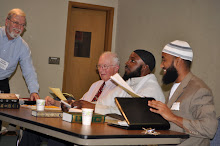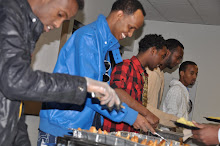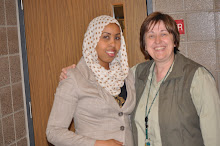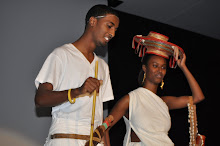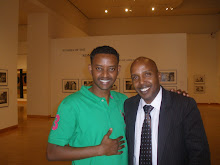
By Lawrence Schumacher • lschumacher@stcloudtimes.com • April 23, 2009
Read Comments(5)Recommend (5)Print this page E-mail this article Share Del.icio.us
Somali women are finding their voice in the St. Cloud area, and Wednesday they shared it with the community.
About 75 people of different races, ethnicities and religions came to St. Cloud's Whitney Senior Center on Wednesday to celebrate the birth of the St. Cloud Area Somali Women's Association, a group organized by Somali women including Fartun Hussein, a community health care worker and the group's executive director.
"Many of us have been waiting for an opportunity to have an organization where we feel welcomed, understood and respected," Hussein told the group at the open house meeting. "Our mission is to bring Somali women and girls together in a positive way."
Somali women are seeking to build connections to other women's organizations in the St. Cloud area and strengthen their voice within the Somali community, Hussein said.
The group began organizing last month and will focus on building opportunities for education and employment, eliminating violence against women and children, and building relationships and promoting leadership among Somali women, she said.
Known as SASWA, the group already has lined up a long list of support from community organizations, and St. Cloud Mayor Dave Kleis was on hand to congratulate them on their efforts.
"Folks need to get to know their neighbors as a community," he said. "I think that is so very important, and I'm glad that groups like SASWA are working to build connections."
When he was organizing the St. Cloud Area Somali Salvation Organization almost a decade ago, Mohamoud Mohamed said he encouraged the creation of a support group for Somali women.
"It's something we've been missing in the last nine years we've been here," he said. "SASWA will connect refugee women to the greater women's community organizations in the area."
There are Somali women's support groups in the Twin Cities, but this is the first of its kind in Central Minnesota, Hussein said.
There have been some roadblocks along the way, but the group has received tremendous support both from Somali women and from the larger St. Cloud community, she said.
The group has the support and encouragement of Create CommUNITY, said Hedy Tripp, the group's coordinator.
"We will share with you all the tools we have," she said. "But it is your organization and your hard work that will make this group a success."
The group is raising money within the Somali community, securing organizational support and relying on a lot of volunteer efforts, Hussein said.
It is registered as a nonprofit with the state of Minnesota and is pursuing tax-exempt 501(c)3 status, she said.
